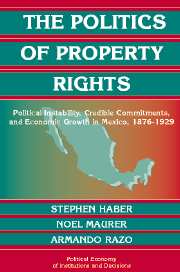 The Politics of Property Rights
The Politics of Property Rights Published online by Cambridge University Press: 02 December 2009
In the previous chapter we explored how, as a theoretical matter, governments and some subgroup of asset holders can create an economic system in which property rights are specified and enforced as private goods. We also explored how the implicit contract between the government and these select asset holders can be made credible via the creation of a coalition with a third group, which receives a stream of rents from the asset holders and provides the government with crucial political support. Finally, we explored why the property rights system laid down by such a coalition might be impervious to changes in the identity and ideology of the government.
Empirical reality is, of course, inevitably messier than any model of it. In order to make models tractable, it is necessary to assume that the actors are behaving as if they are playing a game whose rules and strategies are common knowledge. In the real world, however, it is often the case that some actors have a good sense of the game at hand, while others do not. (Indeed, casual empiricism suggests that many actors in social situations do not even know that there is a game.) Even those who ultimately figure out the rules of the game and the strategies for winning do not start out with that knowledge. They learn the game as they play.
To save this book to your Kindle, first ensure [email protected] is added to your Approved Personal Document E-mail List under your Personal Document Settings on the Manage Your Content and Devices page of your Amazon account. Then enter the ‘name’ part of your Kindle email address below. Find out more about saving to your Kindle.
Note you can select to save to either the @free.kindle.com or @kindle.com variations. ‘@free.kindle.com’ emails are free but can only be saved to your device when it is connected to wi-fi. ‘@kindle.com’ emails can be delivered even when you are not connected to wi-fi, but note that service fees apply.
Find out more about the Kindle Personal Document Service.
To save content items to your account, please confirm that you agree to abide by our usage policies. If this is the first time you use this feature, you will be asked to authorise Cambridge Core to connect with your account. Find out more about saving content to Dropbox.
To save content items to your account, please confirm that you agree to abide by our usage policies. If this is the first time you use this feature, you will be asked to authorise Cambridge Core to connect with your account. Find out more about saving content to Google Drive.